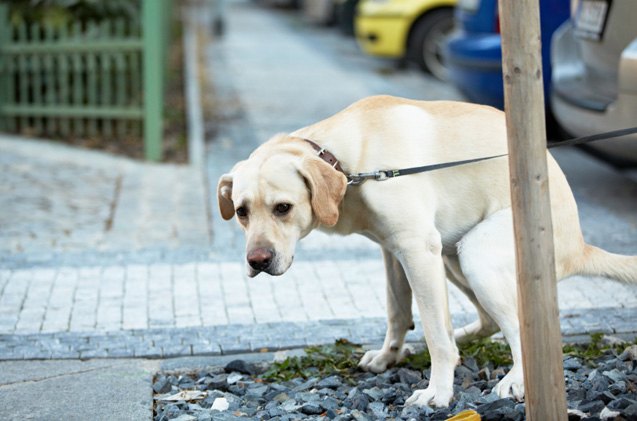8 Sure-Fire Dog Constipation Home Remedies

Contrary to popular belief, constipation isn’t just a human problem. Sometimes, your pooch gets backed up and can’t go either. Fortunately, your pupper doesn’t have to suffer. Try these dog constipation home remedies to get things moving!
If your dog could talk, he’d tell you that it’s no fun to be all bunged up. At some point in his life, your dog will get constipated. It happens to all of us and it is always an uncomfortable situation. However, that doesn’t have to mean that you need to drop everything and take your pet to the vet office that they dread visiting. As a pet parent, there are some home remedies you can try to help with dog constipation and get things flowing again. With just a little effort, your dog can be just as regular as you are after a hearty bowl of All-Bran and a tall cup of coffee.
Although this might sound a bit gross, you’ll have to monitor your dog’s bathroom habits carefully. What comes out of your dog is a great indicator of how healthy the little guy is… and if there’s a poop problem, it means that there’s something more serious wrong with his health. Is your dog straining to poop, but the rocket is failing to launch? Or after several minutes of strenuous doggy effort, are you treated to little more than a tiny round present? Your dog could also be bloated and look like he’s in pain while he’s trying to go. Perhaps the doggy is frantically dragging his butt on the ground without leaving anything behind? These are just a few signs that your dog is constipated. He might not be able to sit you down for an awkward conversation, but he will certainly show signs that his logging factory isn’t able to deliver products.
In most cases, simple constipation can be resolved without needing to use medications, but if things are really bad, you will want to consult a vet. However, if it is merely a minor constipation issue, you may be able to treat it yourself with some sure-fire constipation home remedies. It’s something that every dog owner dreams about! OK, not really. But nevertheless, it beats the alternative, which is much more stressful for your pet and costlier for you. And you do have to do something about it, one way or another, since canine constipation is no joke. It causes discomfort, pain, and can even lead to more serious health issues when left untreated, so don’t neglect to deal with these issues as soon as you notice the first symptoms!
This is a sponsored placement
Constipation can vary from a mild issue that clears away in a day or two to a severe, painful condition that can seriously endanger your pet’s health. If your dog’s constipation issues don’t go away in a few days, you should take them to the veterinarian’s office for a full check-up. Unfortunately, costs of exams, bloodwork, maybe even scans – it all adds up and can be quite a strain on the budget. Seeing as how a seemingly harmless issue can turn into something much more serious, it’s easy to see why it pays to have a reliable pet insurance plan. Lemonade Pet Insurance offers both basic coverage plans and preventative health care for your dog to make sure you can afford the best possible care for your pet without having to spend outrageous amounts of money. Their basic accident & illness plan covers either 70%, 80%, or 90% of medical expenses for diagnostics, procedures, and medications so you can pay just a fraction of the price for the treatment, with an optional add-on for preventative health care that covers everything from wellness exams to routine dental cleaning. The best part is that the rate won’t cost you an arm and a leg, either – for example, you’ll pay $29.50 each month for a 3-year-old Labrador in Texas, with 80% co-insurance, an annual limit of $20,000, and an annual deductible of $250. Adding the Preventative care package to the mix, in this case, would raise the rate to $45.50 – a small price increase that could make a big difference for your pet’s overall health.
Eight Ways To Clear Out Canine Constipation At Home
How can you help your pet pass stool without resorting to meds and ensure their constipation clears up in a few days? There are a few ways you can support your dog’s digestion, improve their bowel movement and help them poop regularly once again – you might have to combine a few different methods to get results, though. Every dog is different, so what works for your pet might not be the best choice for another dog and vice versa!
1. Lots of exercise and clean, fresh water. To keep his digestive system moving, you’ve got to keep your dog moving. It’s as simple as that! Regular exercise will help to push stool straight through the colon, so don’t skip those daily walks and zoomies in the dog park. On top of that, make sure your dog has plenty of fresh, clean water to drink. This will help get that doggy’s juices flowing. Both of these factors can help prevent and remedy dog constipation. So, this is an easy first step in your canine constipation adventure.
2. Adding more fiber to your dog’s diet. Even humans benefit from adding more fiber to their diet, so it’s not a surprise that your dog will also feel better with a fiber-rich diet. And don’t worry, fiber that is safe for dogs is not something exotic or difficult to source – you probably already have some safe dietary dog fiber in your home. If not, you can find some at your local grocery store, as these are foods we also consume, and it’s not a dog-specific product. What’s even better, fiber is really easy to sneak in doggy’s usual dinner and they’ll be none the wiser of the healthy addition to their grub, which is perfect if you have a picky pooch on your hands. Just include canned/pureed pumpkin (1 teaspoon per 10 pounds/body weight); ground/chopped dark green leafy vegetables (1 teaspoon per 10 pounds/ body weight); Coconut fiber/oil: 1 teaspoon per 10 pounds/body weight); or psyllium powder (1/2 teaspoon per 10 pounds/body weight) in your pet's usual meals. If you mix it well into your dog’s favorite wet food, chances are he won’t even notice.
3. Adding digestive enzymes and probiotics to your dog’s diet. This is another preventative measure that could be taken before any problems arise. Mixing some digestive enzymes and probiotics in your pet’s daily meals can help with maldigestion. Imbalance in gut flora is one of the most common causes of canine constipation and even doggy diarrhea – when their delicate gut microbiome is disrupted, all sorts of digestive issues can come into play. This is why it’s better (and certainly less messy) to fight these sorts of problems before they even start. Introducing a quality probiotic, or digestive supplement with enzymes to their regular routine can do a world of wonder if they are already struggling with some digestive troubles, not to mention the good it can do when given as a preventative.
Related: Smashing Pumpkin And Carob Dog Treat Recipe
4. Switch to canned food – but only for a short time. Now, if your dog typically eats dry kibble, mixing the above items into his food won’t always work. However, the dry kibble might actually be the culprit! While nutritionally complete, dry food for dogs is, well, dry – the moisture content is not enough on its own, so if your dog is not drinking plenty of fresh water, they are probably not hydrated enough. So, why not try switching your dog onto a quality canned food for a few days? Since the wet food has more moisture, it’ll be easier for your dog’s bowels to move. This could be an easy fix, so it’s worth a shot.
5. Ginger and Chicken or Beef Broth: By simply mixing these two ingredients together, you’ve got a helpful dog constipation home remedy. Mix ¼ teaspoon ginger with ½ cup of chicken or beef broth. Ginger helps upset tummies and both the ginger and the broth fat will get things moving along. This could be an easy solution made entirely out of items that are already in your pantry – not to mention that it is completely natural, yummy, and made from wholesome ingredients that nourish your pet’s body.
6. Got Milk? The main reason why people shouldn’t give milk to their dogs is that it can give them the runs… which actually makes it perfect when your dog is having constipation issues. Milk acts as a mild laxative for canines! A small bowl will be enough to get things going, often within a few short hours. So make sure your dog is somewhere safe after slurping up the milk.
7. Olive or Vegetable Oil: Again, this is a remedy you don’t want to use too often because it can cause diarrhea. However, desperate times often call for desperate measures. So if your dog’s constipation is rough, add a tablespoon of oil to your dog’s food and clear the room.
8. Bernie’s Perfect Poop: This is the ultimate solution for any doggy digestion issues. It’s a revolutionary formula that uses premium fibers, prebiotics, probiotics, and enzymes to treat your doggy’s digestive tract like royalty. It can be given as a food topper or even as ‘treats’ (yes, they’ll love it that much). So simply feed your doggy a little of Bernie’s special recipe and before you know it that good gut health will will lead to the perfect poop.
Potential Causes of Constipation in Dogs
Having a basic understanding of what might lead to a dog becoming constipated can also help you prevent problems before they occur (or at the very least give you better insight into finding the appropriate remedy). Below are a few reasons why your dog might be having trouble going to the bathroom. Keep in mind that, even though constipation can happen at any age, it tends to occur more often in senior dogs.
- The ingestion of materials likes dirt, stones, toys, or bones that could get stuck in your dog’s intestines.
- An enlarged prostate gland (yep, this happens to dogs too).
- Getting too little, or too much, fiber from food.
- Anal sacs that are abscessed or blocked.
- Not getting enough exercise.
- Dehydration, which may have resulted from another condition.
- Taking medication that causes constipation as a side effect.
- Tumors or masses that are resulting in an obstruction.
- Excessive grooming, leading to too much fur in the stool.
Health problems that make it uncomfortable or painful for your dog to position himself for a bowel movement may also prevent him from going to the bathroom like he should. So, that might also lead to constipation. Hip dysplasia and arthritis are a few examples of conditions that can make it hard for your pooch to blast off, so treating the underlying issue could help him get relief from the constipation as well. That’s why it’s important to ensure your elder dog has regular check ups at the vet to monitor any physical issues that may have been brought about by old age. Quite often, constipation is merely a symptom of a larger problem.
When Home Remedies Aren’t Enough
When you notice that your dog is constipated, you can certainly try some home remedies to help him get relief. But it’s wise to keep in mind that home remedies may not always be enough to resolve the issue. In cases when the remedies suggested above don’t work, your vet has other treatment options available that might be able to help. After all, you wouldn’t rely entirely on home remedies for your own illnesses. You shouldn’t limit your dog to those simple solutions either. There are professionals whose entire job it is to deal with these sorts of problems.
For example, your veterinarian might recommend a prescription diet that is high in fiber and made specifically for canines. Or your vet might prescribe a stool softener or a laxative. Perhaps your dog might even even need enema, a procedure that absolutely needs to be performed by a pro. Plus, there might even be medications that could help boost the strength of your dog’s large intestine in order to encourage a bowel movement for the future. Bottom line: your vet will figure out what is most appropriate for your dog, so don’t hesitate to ask for help. No matter how close you feel to your animal, you can’t solve all of his problems yourself and that’s ok!
When to Contact Your Vet About Your Dog’s Constipation
It’s important to take your dog’s constipation seriously, especially if you have tried the home remedies above and they haven’t cleared out the issue. If the problem continues for more than a few days (a good rule of thumb to consider: if your pooch doesn’t have a bowel movement for more than two days, always call the vet!), if there’s blood in their stool, if your dog is vomiting, or if he becomes listless, this constipation problem could point to serious health issues. In these cases, please contact your veterinarian immediately.
Also, if your pet is crying out, crouching, or straining whenever he’s trying to have a bowel movement, it’s time to get professional help from a vet (especially since the symptoms of constipation can seem a lot like the symptoms associated with a more serious urinary tract issue). Once your vet examines your dog, the right treatment can be administered to bring your doggo immediate relief .
Do you have any dog constipation home remedies to share with us? Please add them to the comment section below. There’s nothing that we love more at Pet Guide than learning new ways to make our dogs poop properly!

Amy Tokic, Editor of PetGuide.com, is a passionate animal lover and proud pet parent of Oscar, a Shih Tzu/Chihuahua cross, and Zed, a Japanese Chin. Her love of animals began in kindergarten, when she brought her stuffed dog Snoopy into class with her every day. Now, she writes about her adventures in pet ownership and tirelessly researches products, news and health related issues she can share with other animal enthusiasts. In her free time, Amy loves perusing used book and record stores, obsessing over the latest pet products available and chasing squirrels with wild abandon (a habit attributed to spending too much time with her pooches).
More by Amy Tokic























